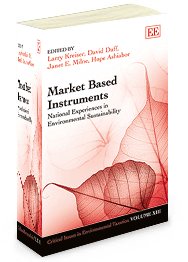Participants at the 15th Global Conference on Environmental Taxation (Copenhagen Conference) will have the opportunity to publish their research in Critical Issues in Environmental Taxation. The Call for Papers for Critical Issues will be sent approximately one month after the end of the Copenhagen Conference.
Critical Issues is published annually by Edward Elgar Publishing Ltd. Edward Elgar has a strong publishing record in the fields of environmental economics, environmental law, and environmental taxation. Additional information on Edward Elgar and Critical Issues can be found at www.e-elgar.com.
Each volume of Critical Issues is limited to approximately 100,000 words (16-19 manuscripts) and has a theme approach. The theme for each volume is determined after the manuscript review process is complete. Readers of Critical Issues include academics, policy makers, accountants, lawyers, and economists.
Manuscripts accepted for publication in Critical Issues deal with insights and analysis for achieving environmental goals through tax policy. Manuscripts submitted for possible publication are reviewed by two external reviewers and should deal with topics that are timely and of regional, national, or international interest. Authors of accepted manuscripts will receive one copy of the publication.
Final versions of manuscripts accepted for publication in Critical Issues should meet the following requirements in addition to any requirements described in a letter of acceptance.
Format. All manuscripts are limited to a maximum of 6,000 words including footnotes, tables, figures, etc. Each table will count as 300 words and each figure will count as 500 words. References are to be placed at the end of the manuscript as endnotes. All manuscripts must be double-spaced, including endnotes, using Microsoft Word format (Times New Roman 11).
English. The manuscript must be written in clear, fluent English so that readers will not be able to distinguish authors who use English as a first language from those who use English as a second language. The editors of Critical Issues encourage any authors who are not fluent in English to engage their own editors who can help them to meet this standard for the final manuscript.
Abstract. If the manuscript starts with an abstract, the abstract should be eliminated from the manuscript prior to submission for possible publication.
Author Credentials. An endnote following the name(s) of author(s) should indicate the author affiliation (without abbreviations) and email address.
Copyright. The author(s) must be the sole owner(s) of the complete copyright and all other rights in the manuscript (apart from copyright material not owned by the author but included in the manuscript with the permission of the copyright holders). The author(s) have the responsibility for obtaining any necessary copyright permissions.
Exclusive Publication. The author(s) of accepted manuscripts must not have published the manuscript previously in another publication and should not publish the manuscript in any other publication without the express permission of the editors of Critical Issues.
Publisher Requirements. The author(s) of accepted manuscripts must respond to the editors promptly when receiving requests to review proofs and sign publication agreements.
Questions? If you have questions regarding publication in Critical Issues, please email Larry Kreiser, Lead Editor, at l.kreiser@csuohio.edu.
Thank You. We look forward to reviewing your manuscript for possible publication in Critical Issues in Environmental Taxation.
